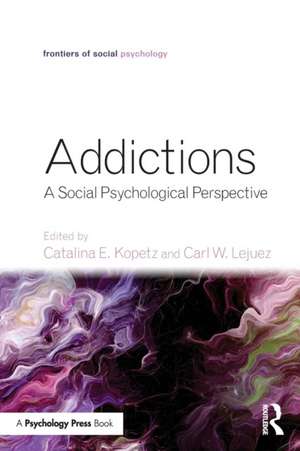Addictions: A Social Psychological Perspective: Frontiers of Social Psychology
Editat de Catalina E. Kopetz, Carl W. Lejuezen Limba Engleză Paperback – 21 dec 2015
| Toate formatele și edițiile | Preț | Express |
|---|---|---|
| Paperback (2) | 102.25 lei 3-5 săpt. | |
| P & R Publishing – 22 oct 2001 | 102.25 lei 3-5 săpt. | |
| Taylor & Francis – 21 dec 2015 | 459.43 lei 6-8 săpt. | |
| Hardback (1) | 1112.34 lei 6-8 săpt. | |
| Taylor & Francis – 21 dec 2015 | 1112.34 lei 6-8 săpt. |
Din seria Frontiers of Social Psychology
-
 Preț: 364.17 lei
Preț: 364.17 lei -
 Preț: 402.58 lei
Preț: 402.58 lei - 15%
 Preț: 460.20 lei
Preț: 460.20 lei - 8%
 Preț: 384.45 lei
Preț: 384.45 lei - 9%
 Preț: 1005.48 lei
Preț: 1005.48 lei - 12%
 Preț: 299.52 lei
Preț: 299.52 lei -
 Preț: 492.20 lei
Preț: 492.20 lei -
 Preț: 435.59 lei
Preț: 435.59 lei -
 Preț: 487.16 lei
Preț: 487.16 lei -
 Preț: 468.36 lei
Preț: 468.36 lei -
 Preț: 478.98 lei
Preț: 478.98 lei -
 Preț: 495.62 lei
Preț: 495.62 lei -
 Preț: 448.49 lei
Preț: 448.49 lei -
 Preț: 435.59 lei
Preț: 435.59 lei -
 Preț: 496.01 lei
Preț: 496.01 lei - 31%
 Preț: 765.77 lei
Preț: 765.77 lei - 15%
 Preț: 470.85 lei
Preț: 470.85 lei -
 Preț: 482.62 lei
Preț: 482.62 lei - 25%
 Preț: 770.98 lei
Preț: 770.98 lei - 16%
 Preț: 351.26 lei
Preț: 351.26 lei - 15%
 Preț: 459.43 lei
Preț: 459.43 lei - 30%
 Preț: 772.79 lei
Preț: 772.79 lei - 15%
 Preț: 488.43 lei
Preț: 488.43 lei -
 Preț: 491.21 lei
Preț: 491.21 lei -
 Preț: 490.25 lei
Preț: 490.25 lei - 18%
 Preț: 1115.51 lei
Preț: 1115.51 lei -
 Preț: 477.82 lei
Preț: 477.82 lei
Preț: 459.43 lei
Preț vechi: 540.50 lei
-15% Nou
Puncte Express: 689
Preț estimativ în valută:
87.91€ • 91.79$ • 72.76£
87.91€ • 91.79$ • 72.76£
Carte tipărită la comandă
Livrare economică 04-18 aprilie
Preluare comenzi: 021 569.72.76
Specificații
ISBN-13: 9781848725270
ISBN-10: 1848725272
Pagini: 300
Ilustrații: 4 black & white illustrations, 2 black & white tables, 5 black & white line drawings
Dimensiuni: 152 x 229 x 20 mm
Greutate: 0.41 kg
Ediția:1
Editura: Taylor & Francis
Colecția Routledge
Seria Frontiers of Social Psychology
Locul publicării:Oxford, United Kingdom
ISBN-10: 1848725272
Pagini: 300
Ilustrații: 4 black & white illustrations, 2 black & white tables, 5 black & white line drawings
Dimensiuni: 152 x 229 x 20 mm
Greutate: 0.41 kg
Ediția:1
Editura: Taylor & Francis
Colecția Routledge
Seria Frontiers of Social Psychology
Locul publicării:Oxford, United Kingdom
Cuprins
I. Introduction. Allergies and Affinities: Social Psychology Pathways as Ways of Seeing Inside ‘Addiction’, N. Campbell. II. Basic Processes. Delay Discounting and Addictive Behavior: Review of the Literature and Identification of Emerging Priorities, M. Amlung, J.C. Gray, J. MacKillop. Motivation and Self-regulation in Addiction, C.E. Kopetz. Social Exclusion and Risky Health Decisions: Substance Use Cognitions and Behaviors, M.L. Stock, F.X. Gibbons, J.B. Beekman. Alcohol and Emotion: The Importance of Social Context, M.A. Sayette, C.E. Fairbairn, K.G. Creswell. The Role of Expectancy in Substance-Abuse Progression, H. Treloar, S.L. Pedersen, D.M. McCarthy. Social Identity and Substance Use: The Role of Racial Ethnic Identity and Gender-relevant Factors that Contribute to Substance Use Among Diverse Populations, A. Kaya, D.K. Iwamoto, L. Clinton, M. Grivel. Social Influence, Pressure, and Norms: Vulnerability for Substance Use in Adolescents, C. Neighbors, C.M. Young, H. Krieger, J.L. Tackett. III. Application Challenges. How Basic Science Can Inform Prevention, Treatment, and Policy. Cognitive Motivational Processes Underlying Addiction Treatment, R.W. Wiers, D. Becker, R. Holland, F. Moggi, C.W. Lejuez. Self-affirmation Intervention and the Reduction of Addictive Behaviors, O. Fotuhi, G.L. Cohen.Public Communication for Drug Abuse Prevention: A Synthesis of Current Meta-Analytic Evidence of Message Efficacy, C.R. Jones, D.Albarracin.
Recenzii
Addiction is such a puzzle. Many theories and approaches have been tried, to varying success. It’s time for an updated, comprehensive overview of addictive behavior, which this volume provides. Topics ranging from behavioral economics to implicit cognition to social norms to merely being in a group showcase how the mind and body influence addiction. This is a mesa-level survey that gives enough details so that you grasp the point without getting bogged down by inane details. Ideal for the scholar who wants to know the basics on the psychology of addiction.
Kathleen Vohs, Carlson School of Management, University of Minnesota; editor of the Handbook of Self-Regulation (Guilford)
"Kopetz and Lejuez have assembled an excellent team of addiction scientists who have produced a text the will quickly make its mark. Particularly noteworthy is the chapter entitled "Motivation and Self-regulation," which should be required reading for anyone in the addiction field. It will change your perspective and help you to understand why people behave as do."
Carl Hart, Ph.D., Professor of Psychology in Psychiatry, Departments of Psychology and Psychiatry, Columbia University
Kathleen Vohs, Carlson School of Management, University of Minnesota; editor of the Handbook of Self-Regulation (Guilford)
"Kopetz and Lejuez have assembled an excellent team of addiction scientists who have produced a text the will quickly make its mark. Particularly noteworthy is the chapter entitled "Motivation and Self-regulation," which should be required reading for anyone in the addiction field. It will change your perspective and help you to understand why people behave as do."
Carl Hart, Ph.D., Professor of Psychology in Psychiatry, Departments of Psychology and Psychiatry, Columbia University
Notă biografică
Catalina E. Kopetz (PhD, University of Maryland, 2007) is Assistant Professor of Psychology at Wayne State University. Her research focuses on the mechanisms that underlie multiple goal pursuit and management of goal conflict and their implications for phenomena of high public health relevance (i.e. overeating, substance use, risky sexual behavior, drunk driving). She has published in prestigious journals spanning social and clinical psychology, prevention sciences, psychopharmacology, behavioral and brain sciences, as well as journals appealing to a broader audience such as Perspectives in Psychological Science, Current Directions in Psychological Science, and Psychological Review. Her research has been funded by the National Institutes of Health (including NIDA and NIAAA).
Carl W. Lejuez (PhD, West Virginia University, 2000) is the Director of the Center for Addictions, Personality, and Emotion Research and Professor of Psychology at the University of Maryland. Dr. Lejuez's research is translational in nature; he uses laboratory methods to understand mechanisms of addiction and seeks to apply this information in the development of novel assessment and treatment strategies. His research spans the clinical domains of addictions, personality pathology, and mood disorders, and he is most interested in the common processes across these conditions. Lejuez’s research has been funded continuously by NIH (including NIDA, NIAAA, NCI, and NIA) since 2002 and he has published over 200 papers (10,000 citations according to Google Scholar). He is the founding editor of the Journal Personality Disorders: Theory, Research, and Treatment and serves on the editorial board of five other journals including Clinical Psychology Review and Psychology of Addictive Behaviors.
Carl W. Lejuez (PhD, West Virginia University, 2000) is the Director of the Center for Addictions, Personality, and Emotion Research and Professor of Psychology at the University of Maryland. Dr. Lejuez's research is translational in nature; he uses laboratory methods to understand mechanisms of addiction and seeks to apply this information in the development of novel assessment and treatment strategies. His research spans the clinical domains of addictions, personality pathology, and mood disorders, and he is most interested in the common processes across these conditions. Lejuez’s research has been funded continuously by NIH (including NIDA, NIAAA, NCI, and NIA) since 2002 and he has published over 200 papers (10,000 citations according to Google Scholar). He is the founding editor of the Journal Personality Disorders: Theory, Research, and Treatment and serves on the editorial board of five other journals including Clinical Psychology Review and Psychology of Addictive Behaviors.
Descriere
The current volume brings together social psychological theories and concepts and discusses their relevance to understanding substance use and addiction. It identifies convergence points between traditional perspectives on addiction and social psychological theory and research. This coexistence, which acknowledges the value of the conceptual and methodological advancements in each relevant field and attempts to integrate them, promotes scientific understanding and a more effective prevention and treatment of addiction.












